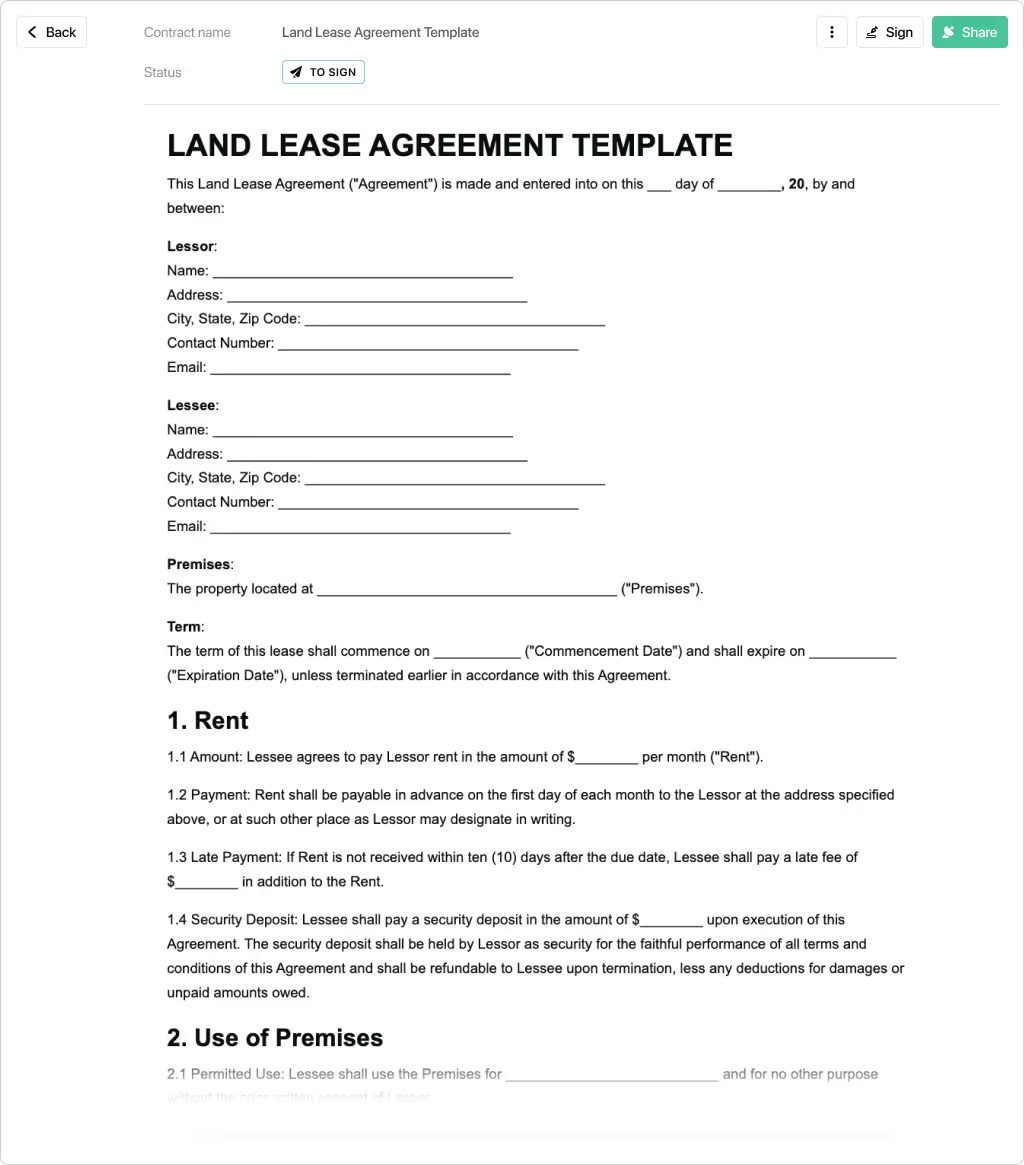Solutions
Customer Support
Resources
Download your free land lease agreement template and streamline your contract creation process.




Land lease agreements are a vital part of many business operations, especially in the real estate sector, outlining the terms and conditions under which one party leases land from another. If you're looking to streamline your land lease agreements and make the process more efficient, using a well-crafted template can be a game-changer.
In this article, we will explore everything you need to know about land lease agreement templates, their purpose, and how Juro can help you manage them effectively.
A land lease agreement is a legal contract between a landowner (lessor) and a tenant (lessee) that allows the tenant to use the land for a specified period in exchange for rent. This agreement outlines the rights and responsibilities of both parties and sets out the terms under which the land can be used.
Key elements typically included in a land lease agreement are:
The primary purpose of a land lease agreement is to provide a clear, legally binding framework that governs the relationship between the landowner and the tenant. This helps to prevent misunderstandings and disputes by clearly defining the expectations and obligations of each party. Specifically, a land lease agreement aims to:

Land lease agreements are usually managed by legal and commercial teams within businesses. These teams ensure that the contracts are drafted, executed, and managed in accordance with company policies and legal requirements.
Legal teams may draft and review the agreements to ensure they are legally sound and compliant with relevant laws, while commercial teams might oversee agreements related to the commercial use of land, such as for offices, retail spaces, or industrial purposes.
Land lease agreements are used in a variety of contexts. Here are some common use cases:

A comprehensive land lease agreement template should include the following sections:
Managing land lease agreement templates can be challenging, especially for businesses that handle a high volume of contracts. Here’s how these templates are typically managed:
Drafting: Legal teams draft and customize the standardized contract template, ensuring it includes all necessary provisions and complies with relevant laws.
Review and approval: The draft is reviewed by relevant stakeholders, such as legal and commercial teams, before being approved for use.
Customization: The template is customized for each specific lease, including details like the parties involved, rent amount, and lease term.
Execution: The contract is signed by both parties, either with wet ink signatures or electronically.
Storage: The executed agreement is stored in a secure location, such as a contract management system or a physical filing system.
Monitoring: The lease is monitored to ensure compliance with its terms, including rent payments and maintenance responsibilities.
Renewal or termination: The agreement is either renewed or terminated at the end of the lease term, depending on the needs of the parties involved.
Managing land lease agreement templates can present several challenges:

Juro’s AI-native contract automation platform offers a robust solution for managing land lease agreements. Here’s how Juro can help:
Empower your teams to handle simple land lease agreements independently. Juro’s intuitive interface allows non-legal team members to generate and manage contracts, reducing the workload on your legal team and improving productivity.
Streamline the entire contract lifecycle with AI-native drafting and negotiation tools. Juro enables faster deal closures and efficient operations by automating repetitive tasks and providing automated contract templates that adapt to your needs.

Store all your land lease agreements in one secure location. Juro’s centralized repository ensures better risk management and compliance, helping you avoid missed renewal dates and regulatory issues.
Facilitate seamless collaboration across teams in a single workspace. Juro’s platform allows for real-time contract collaboration, ensuring all stakeholders are on the same page and improving communication and efficiency.
Juro integrates seamlessly with a wide range of real estate tools and CRMs through Zapier, including Wise Agent CRM, Zillow, Cloze, Real Geeks, and Chime. This enables teams to generate contracts in seconds, with all transaction data pulled directly from the CRM to populate the contract.
Juro is the contract management tool of choice for growing businesses in the real-estate and proptech space. Customers like AppearHere, WeWork, Placemakr, and HappyCo trust Juro for their contract needs. Here’s why:
Juro’s AI-native contract automation platform empowers all teams to create, agree, execute and manage contracts up to 10x faster than traditional tools. To find out more, hit the button below to book your personalized demo.
Juro is the #1-rated contract platform globally for speed of implementation.


